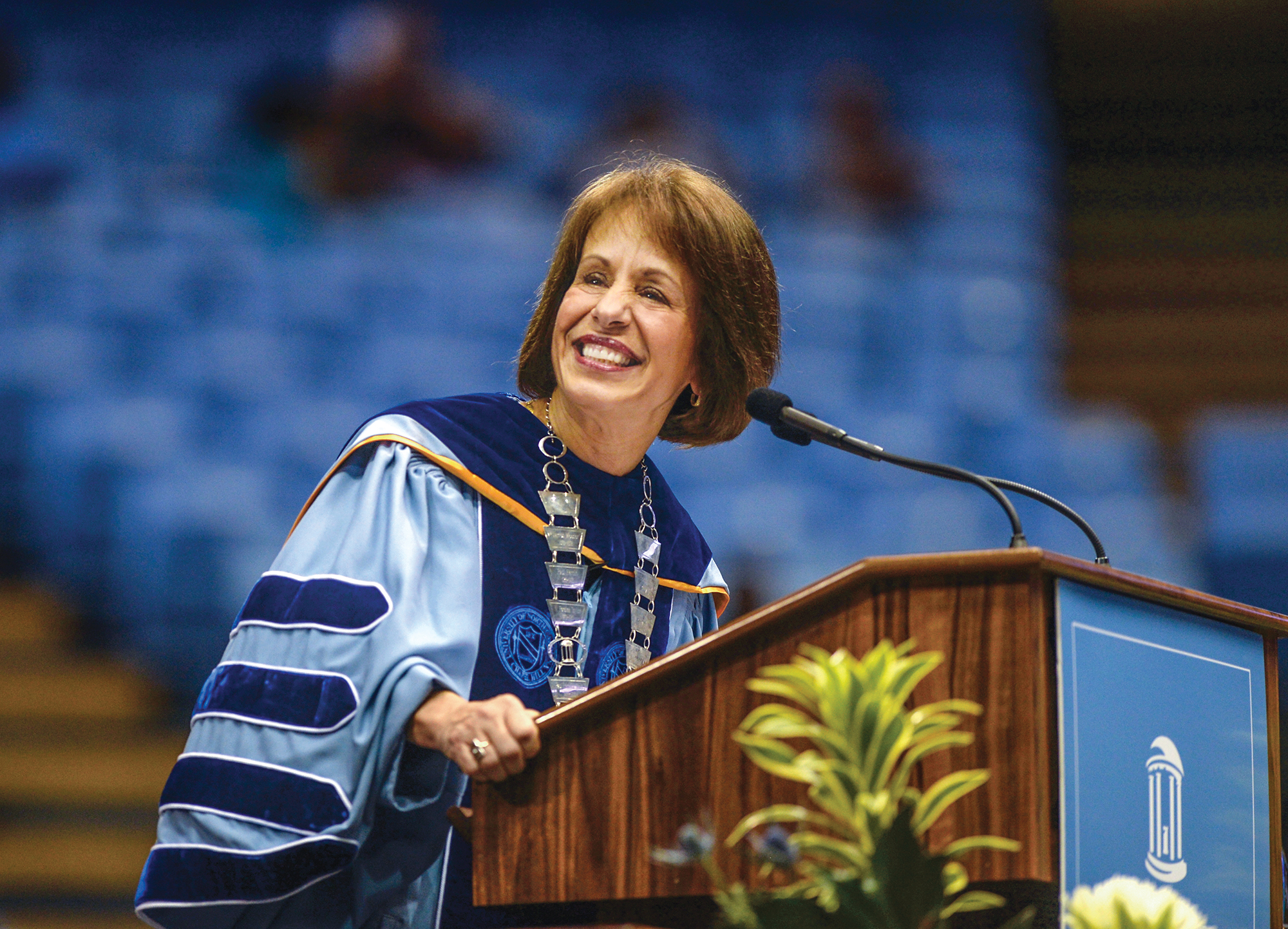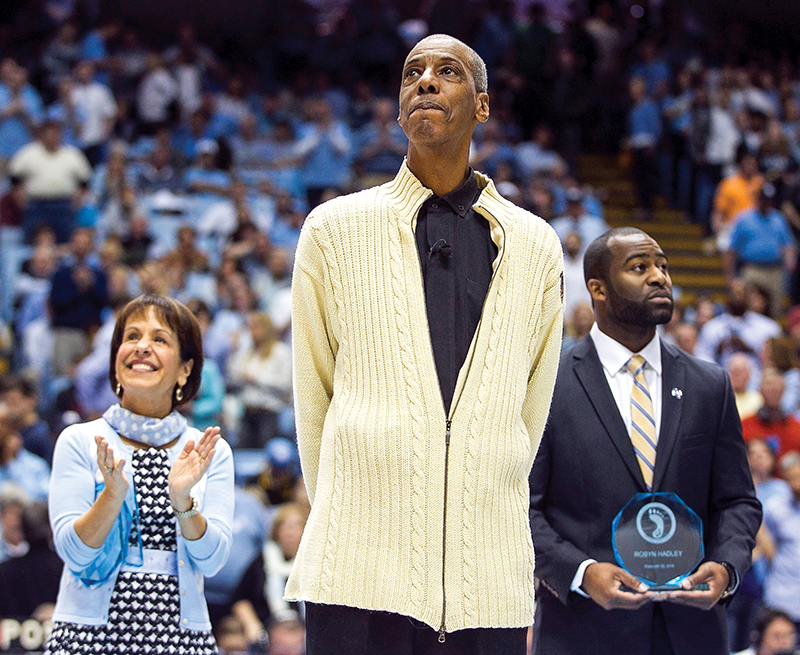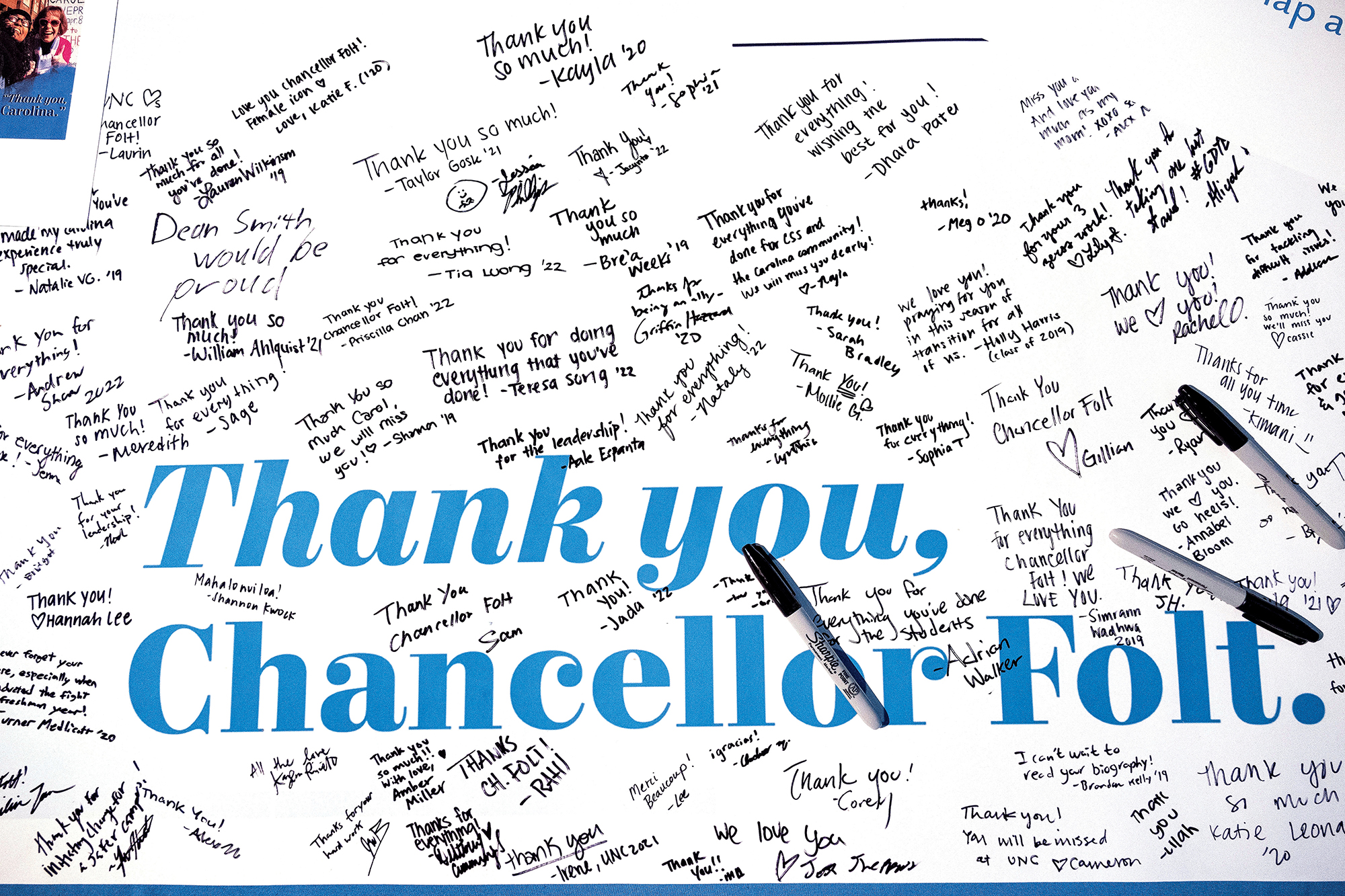Folt Leaves “at Complete Peace”
Posted on March 6, 2019
Chancellor Carol L. Folt makes remarks during the 2015 Winter Commencement ceremony at the University of North Carolina at Chapel Hill.
The chancellor told the GAA Board of Directors, “I always come here and remember saying to you, the new norm is certain uncertainty.”
On Jan. 19, four days after the UNC System Board of Governors accepted the resignation of Chancellor Carol L. Folt, effective Jan. 31, the chancellor paid her final visit to the GAA Board of Directors at its quarterly meeting. Earlier in the week, she had given notice of her resignation and authorized the last of the Confederate monument Silent Sam — its pedestal and commemorative plaques — be removed from campus. Following are excerpts from her remarks.
“I want everyone to know I am at complete peace with what I did and how it went down. I have no regrets. Of course, I have regrets we ever got to this situation, but when you have something like this, and you have done what we have been doing, I am at peace with the decision.
“Like all of you, when something big happens, you go through those stages of grieving because I love this place. … I am a Tar Heel, and I always will be, and I will always have such incredible respect and affection for everyone. That doesn’t go away. I always come here and remember saying to you, ‘The new norm is certain uncertainty.’

The Daily Tar Heel spoke with Charlie Scott ’70, the first black men’s basketball player at UNC, regarding his thoughts on Silent Sam and the Board of Governors’ decision to push Chancellor Folt’s resignation forward. (News & Observer photo by Robert Willett)
“One of the very first people who called me [after I announced my resignation] was Charlie Scott. I said, ‘Charlie, why are you calling me? You experienced more things and have shown more courage than anything I could ever possibly imagine.’ He reached out in such a beautiful way. He has [given] an amazing interview [to The Daily Tar Heel] about me, but it also speaks more to Charlie and Coach Smith. His reason for doing it is that he wants students of today to be thoughtful and understand what issues really confront people and their leaders. Here is someone reaching to comfort, putting himself out there and wanting to teach, and I think that is about as wonderful an example of who people are here and how they want to make things better.
“Another great example is of a woman I was talking to in Arts and Sciences, and she said she had gone out to the site to look. Many people are going out to look at the site. She said she was just standing by herself, and there was a stranger standing next to her, and they just turned and looked at each other and started hugging each other and crying. I have felt that emotion more than anyone could imagine for a long time. This is not the end, but that is so real to people. I think people have to find each other to have to get to the next healing, the big truth and reconciliation. It has to be strangers reaching out to each other to hug and cry and go forward.

Carol Folt’s last weeks were filled with good wishes on a campus where turmoil had been no stranger. She spent a lot of that time with students. (UNC photo by Jon Gardiner ’98)
“I wanted to share an example of one [email] that has almost blown my mind that a student wrote me:
“ ‘Dear Chancellor Folt, I have not liked you. But my favorite things I have ever done at Carolina are Arts Everywhere, the Three Zeros, and the Edible Garden,’ and he said, ‘I am fully aware that those are three initiatives that you have been completely responsible for at this institution.’ And, he said, ‘But for some reason I put you as the face of Silent Sam.’ He said, ‘I woke up and read this, and I have lost my confidence in my ability to really understand what is happening when things like this happen, and it is making me rethink how I think about things I read and see.’ He … thanks me and says he is really sorry, and at the end, he says, ‘I don’t know if this matters to you, but I am an African-American male.’
“To be able to do that and think about these in such personal ways that are healing ways, to me, that was more important than almost anything. That people can confront things and learn to heal, so certainly that is not happening in our country right now. It was truly phenomenal.”
The chancellor closed her remarks with an overview of recent University accomplishments, including three that address financial needs and how they are being met:
• In For All Kind: the Campaign for Carolina, launched in October 2017, the University has passed the halfway mark ahead of schedule. The $4.25 billion campaign is the most ambitious university fundraising campaign in the Southeast and in Carolina history. Nearly one-quarter of the overall campaign goal, $1 billion, will fund undergraduate scholarships and graduate fellowships.
• Carolina now has “the greatest number of veterans and military-affiliated students here since World War II, and now we have aid directly specifically for those families. These are things this institution is really setting a high bar for.” The Carolina Edge scholarship initiative, launched as part of the For All Kind campaign, received a $20 million challenge gift from Debbie ’78 and Steve ’78 Vetters to fund the Red, White and Carolina Blue Challenge to provide need-based aid for dependents of military families who qualify for the Carolina Covenant.
• The $20 million Blue Sky Scholars program was launched on University Day 2018 with a $5 million gift from former UNC System President Erskine Bowles ’67. Its goal is to fill a gap that involves highly qualified North Carolina residents from middle-class backgrounds who qualify for financial aid but do not meet the requirements for the Carolina Covenant, UNC’s program to guarantee that students from low-income families can graduate debt-free. “We have the amazing Covenant Scholars,” Folt said, and “the Red, White and [Carolina] Blue, the Morehead [-Cains], the Robertsons, the need-based aid, but what we have never had is enough in the middle-income group to help those students who really do have a hard time doing overseas experiences, working and all of that, to have that amazing experience. Everyone has talked about that since I have come, and we got it going. … Being able to be a part of that has been fantastic. We have already raised almost $450 million for [overall] aid. That is one of my regrets. I would have liked to be here on the day we do the bell of $1 billion, but I will come back. That would be fun.”
More online:
The Daily Tar Heel’s Q&A with Charlie Scott ’70 is at bit.ly/DTH_Charlie_Scott.
Thanks for reading the Carolina Alumni Review
Carolina Alumni members, sign in to continue reading.
Not yet a member? Become one today.
